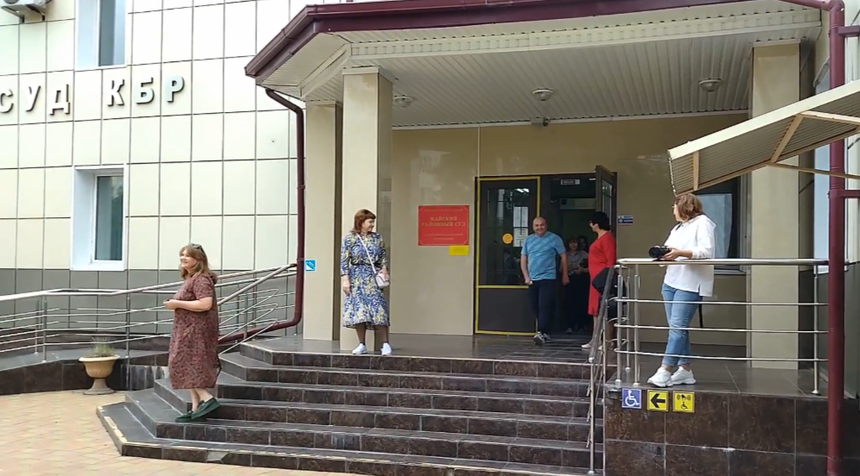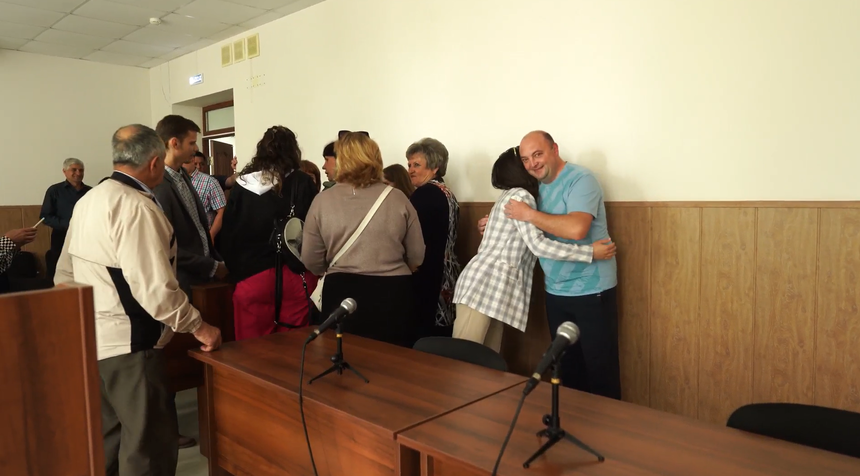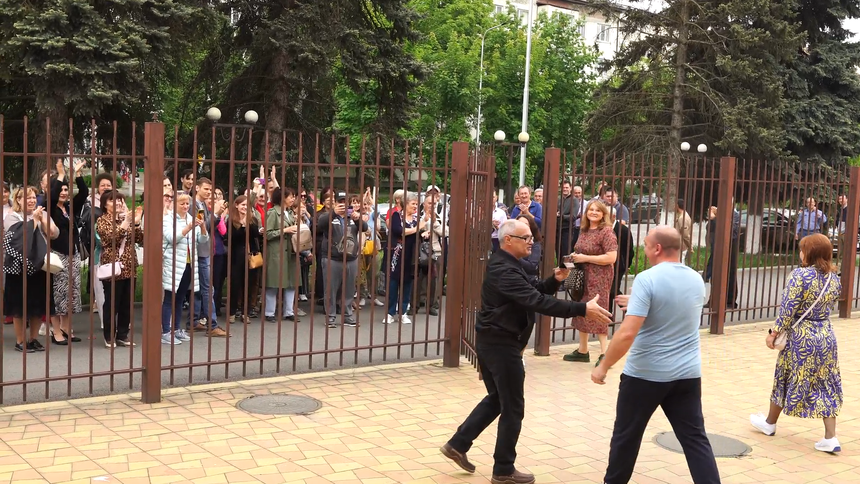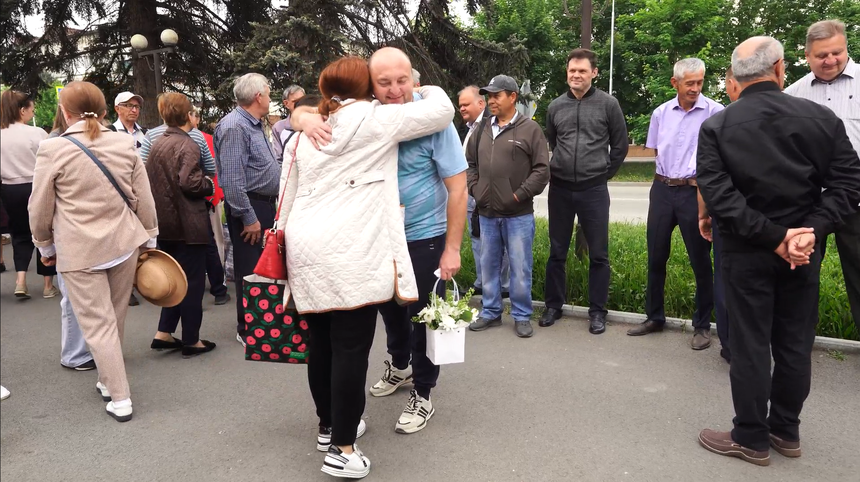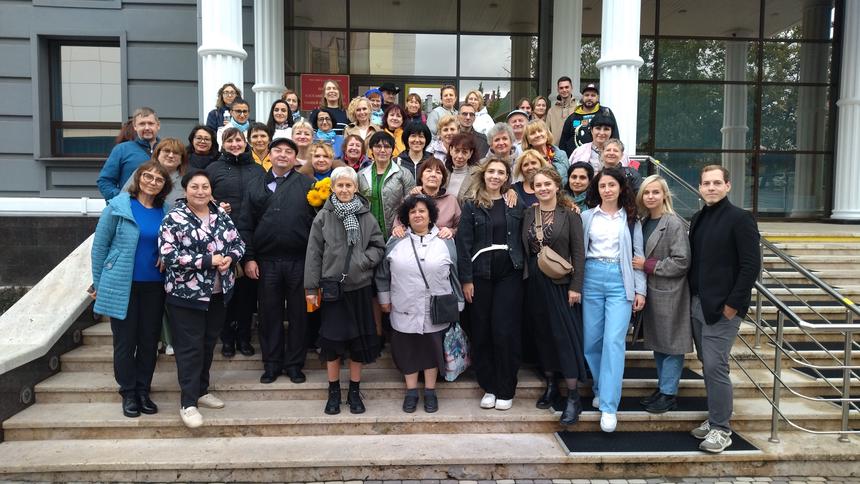"They imprison less, but more severely." Repressions against Jehovah's Witnesses: 2024 Overview
Courts continue to send Jehovah's Witnesses to prison, and the sentence of three of them has set a new record for severity. There have been cases of violence and torture, the proportion of the elderly among the "prisoners of conscience" has increased, there are people with severe disabilities, one of whom died shortly after the verdict; the trend of prosecuting entire families continues. Read about these and other findings for 2024 in this article.
Year in numbers

As of December 16, 2024, since the beginning of the year, Russian security forces have conducted at least 96 searches in the homes of Jehovah's Witnesses — 17 in Crimea being the highest number. The total number of raids since the ban reached 2157.
During 2024, 41 persons were made defendants in new criminal cases, of which 19 went through various types of detention, 15 of them are still behind bars. Last year, criminal cases were initiated against 100 believers.
Sentences were handed down to 116 believers. 43 of them (37%) were sentenced to imprisonment (It is noteworthy that this year nine people were sent to forced labor as a punishment). Terms of more than five years were given to 24 people (or almost 56% of those sentenced to imprisonment).
"The cumulative numbers and severity of custodial sentences are increasing. To put it simply, during this year they imprisoned less, but more severely," Yaroslav Sivulskiy, a representative of the European Association of Jehovah's Witnesses, commented on the statistics.
In 2024, the court handed down record-breaking sentences against three Jehovah's Witnesses. Khabarovsk residents Nikolay Polevodov, Vitaliy Zhuk and Stanislav Kim received eight years and six months, eight years and four months, eight years and two months in a penal colony, respectively. After about three months the court of appeal changed the punishment from imprisonment to a suspended sentence for shorter terms. Therefore, the longest term in 2024 was given to Alexander Chagan from Tolyatti — eight years in a penal colony. All in all, six believers have received such a harsh sentence since 2017.

Over the seven years of mass persecution of Jehovah's Witnesses, the number of people sentenced has reached 543, and 186 believers have been imprisoned. Almost 61% of them (113 people) received terms of more than five years.
For comparison: according to the official statistics of the Judicial Department at the Supreme Court of Russia for 2023, of the 1297 people convicted for intentional infliction of grievous bodily harm, only 0.85% (11 people) were sentenced to terms of five to eight years. Most were sentenced to terms of two to three years. It seems that from the point of view of the Russian judicial system, Jehovah's Witnesses are more dangerous than those who beat people to the point of disability. At the same time, hundreds of trials against Jehovah's Witnesses accused of extremism have not confirmed a single fact of extremist activity on the part of the believers.
Hunting the Elderly
Of the new defendants who appeared in 2024, eight are over 60 years old, the oldest is 74 (Nina Smirnova). In total, among those charged with extremism, 235 people (156 men and 79 women) belong to this age category — this is almost 28% of all those prosecuted. "Up until last December, this share was 26%, and it increased by 2% in 2024. It may not seem much, but there are real people behind the numbers, whose freedom, health and even life are under threat," said Yaroslav Sivulskiy. "Unfortunately, during criminal proceedings, 9 elderly men and women have already died. One of them — Aleksandr Lubin who was seriously ill. He died a month after his verdict was announced."

"He was very anxious on the days of the court hearings. Afterwards he and his wife needed a couple of days to recover, he had to lie down almost all the time on these days," Lubin's lawyer said. "Over the course of the year, his illness progressed and in December he was hospitalized, where he stayed longer than usual. After discharge, his condition remained serious."
Shortly before his death, Lubin said in court: "It was very painful for me to see how elderly witnesses were interrogated during court hearings in my case. The investigation seemed to deliberately select those who were over 80. They no longer see and hear well; they do not understand many words. Therefore, it gave the impression that the investigators drew up the interrogation protocols at their own discretion."
As of the end of 2024, 27 believers over the age of 60 are being held in colonies, pretrial detention centers, and special detention centers for persons sentenced to forced labor. For example, Boris Andreyev, 73, who was sentenced to six years in a penal colony (he is suspected of having cancer), and Anatoliy Marunov, 71, who received six and a half years in a penal colony, remain behind bars. "The oldest of all the convicted Jehovah's Witnesses is Yuriy Yuskov. When the suspended sentence imposed on him ends, he will be 90 years old. The oldest defendant is Elena Zayshchuk, 90" said Yaroslav Sivulskiy.
One of the examples when the courts did not even try to create the appearance of legality of the process is the case of Tatyana Piskareva. She is 68 years old, and for the past few months she has been held in the correctional center at colony-settlement No 3 for the Oryol Region. In the spring of 2024, the court sentenced her to two and a half years of forced labor, a type of punishment that, as expressly stated in Article 53.1 of the Criminal Code, is not imposed on old-age pensioners. Tatyana mentioned this in her appeal. However, as said in the decision of the appeal court, "the requirements of Article 53.1 of the Criminal Code of Russian Federation were observed by the court."
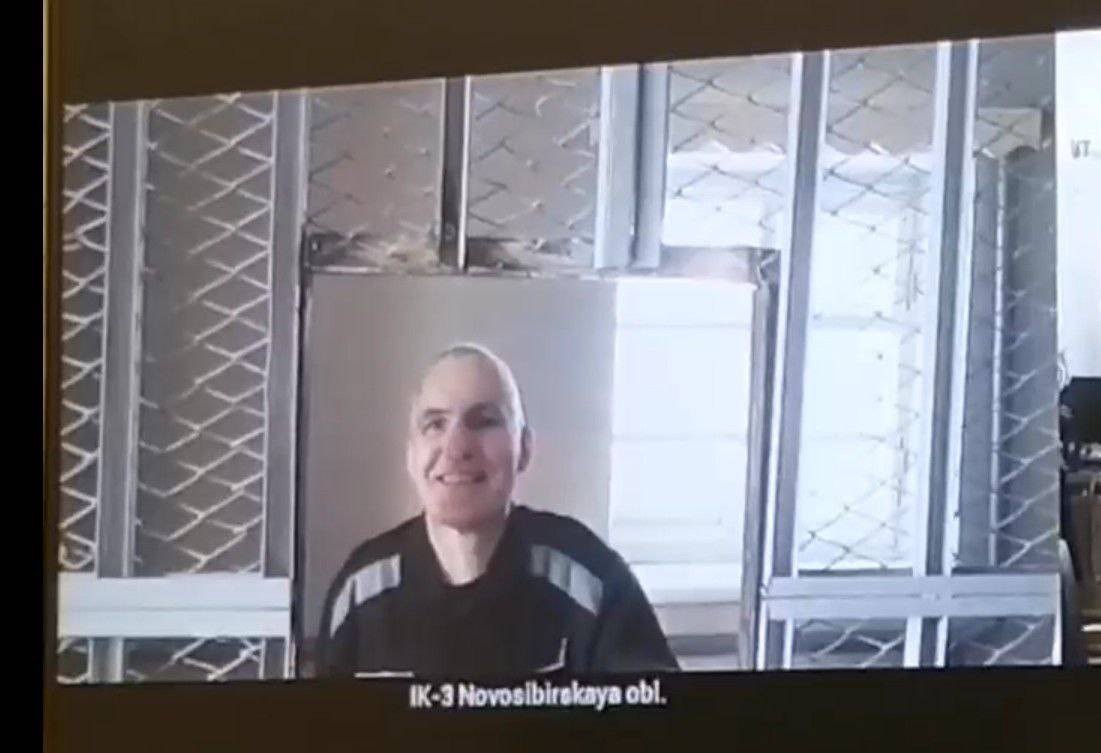
Andrey Vlasov, 56, who has a severe disability, has already been in prison for more than two and a half years. He was sentenced to seven years in a penal colony, and the courts deny him early release, despite his rapidly deteriorating health. He is practically unable to move his joints. He experiences constant pain, which is why even everyday tasks — for example, putting on underwear — are very difficult. Some tasks that are simple for a healthy person are completely beyond Vlasov's strength. He has already fallen several times and could not get up on his own. According to the surgeon, Andrey needs an operation. Failure to do so will lead to an ischemic stroke of the spinal cord and paralysis of the limbs.
Moreover, the Russian law enforcement system is not lenient to those who are younger, but whose health also requires a special approach. Vladimir Fomin, 44, who is disabled, has been in a pretrial detention center since the end of March 2024. According to his lawyer, Fomin's condition is getting worse — his chronic illnesses have been exacerbated, and there is no proper treatment. During one of the hearings, he lost consciousness, an ambulance had to be called.
Torture and Violence
In 2024, four cases of violence by law enforcement officers became known. Also, one case of torture in a place of detention was recorded against convicted Rinat Kiramov of Akhtubinsk. The prisoners demanded that Rinat give the names of Jehovah's Witnesses living in Akhtubinsk.


Did the pressure achieve its goal? "After beatings and torture, Rinat does not feel that he is a victim. On the contrary, he feels great joy, because he endured everything with dignity, "said Kiramov's wife Galina shortly after the events described.
During raids in Omsk in March 2024, security forces beat Sergey Rygaev and Leonid Pyzhov.
In the same month, during a search in Tolyatti, Sergey Fedorov was beaten and detained. He is still behind bars.
On September 16, during raids in Samara, law enforcement officers had been using force against one of the believers for several hours. At some point, the man lost consciousness.
On December 5, during searches in Moscow, the security forces hit one believer on the head and abdomen, and broke his nose.
Prosecution of Families

The number of families where more than one person was prosecuted for their faith has exceeded 80. At least nine of them were added in 2024. In one of the cases, three married couples were made defendants at once — Vladimir and Anastasiya Anufriyev, Viktor and Alena Chernobaev, as well as Andrey Mikholap and his wife Oksana. All of them are in pretrial detention at the time of writing.
In December 2024 , Kristina Golik, Valentina Yermilova and Yekaterina Olshevskaya were sentenced to forced labor. Earlier, their husbands received long prison terms and are serving their sentences in a penal colony. Before the verdict was announced Yekaterina stated in court: "My husband and my father are imprisoned under the same article. I can see my husband only a few times a year. My son, who is four years old, misses his dad very much and is constantly worried that I will also be sent to prison. Every time he accompanies me to court, my young son asks: 'Mom, will you return home today?'"

Similar concerns were expressed by Kristina Golik: "My husband will be released in 2027, after which his freedom will be restricted for another year, and he will have a further eight years of administrative supervision. If I am given a prison sentence, then I will have to serve it... The question is: after how many years will we be reunited? I'm scared to even think about it."
However, the issue of destroying the families of Jehovah's Witnesses turned out to be insignificant for the court — if the sentence enters into force, the believers will have to serve their sentences in a special institution for carrying out forced labor.
Repressions Against Convicted Persons
With the passage of time, law enforcement officers find new ways to put pressure on those who are imprisoned for their faith. For the first time since 2017, one of Jehovah's Witnesses Viktor Stashevsky ended up in regular prison (not to confuse with a penal colony). Prior to that, he was held under strict detention conditions on the basis of penalties, most of which he was unaware of.
Detention in strict conditions of imprisonment — placement in a punishment cell, CTF and SCTF — is a frequent practice in the cases of Jehovah's Witnesses. According to the rules, a prisoner should not be kept in such a room for more than 15 days, but in practice the punishment is extended, so that believers are kept in strict conditions for months. For example, Alam Aliyev, sentenced to six and a half years in a penal colony, has already been held for almost six months under strict detention conditions in IK-8 for the Amur Region. This is not compatible with the state of his health — he has diabetes mellitus, kidney disease, cardiac and neurological disorders.
Often, the conditions for imprisoned Jehovah's Witnesses are hardened on the basis of fabricated or far-fetched violations. The reason may be an unfastened button or the absence of a tag with the prisoner's name on the cabinet. Sometimes the prisoner does not even know what violations he is charged with. Such penalties are used as grounds for denying believers visits from relatives and make it almost impossible for them to be released on parole. It happens that in a particular colony there is no room corresponding to the punishment. In this case, prisoners are transported to another (sometimes remote) region, to a colony where such a room exists. This limits the possibility to see relatives and receive parcels.

There are also specific methods of pressure — when believers are deprived of the opportunity to read the Bible. Often this is done under the pretext that the book does not have a stamp of approval from the Russian Orthodox Church. In the case of Andrey Danielyan and the abovementioned Rinat Kiramov, the FSIN officers went even further — personal copies of the Bible were seized not only from them, but also from all other prisoners. Kiramov's relatives said that before that, other convicts lent Rinat their copies, but the colony staff forbade them to do so. Not only the Bible was confiscated from Danielyan, but also a personal notebook with quotes from this book.
Practicing their religion can even result in a new term for a prisoner, as in the case of Dmitriy Terebilov from Kostroma. He became acquainted with the Bible many years ago in the penal colony. Thanks to his new knowledge, Dmitriy changed so much that the administration of the institution itself petitioned for his early release. After his release he became one of Jehovah's Witnesses. Later, Dmitriy was convicted again, this time for his faith. On September 5, his term of imprisonment expired but he was not freed. A new criminal case was initiated against him for answering questions from a cellmate about the beliefs of Jehovah's Witnesses. Now Dmitry is in a pretrial detention center and awaiting another trial. He faces an extension of his term from three to 10 years.
New Acquittal
In 2024, Ruslan Atakuyev, judge of the Mayskiy District Court of Kabardino-Balkaria, found Kirill Gushchin not guilty of extremism. This decision withstood the courts of appeal and cassation, and the prosecutor's office made an official apology. Since 2017, various courts have issued a total of 10 acquittals, but until that moment, only two of them were not overturned. In May 2021, the same Mayskiy District Court acquitted Yuriy Zalipayev.
Kabardino-Balkaria is the only region in Russia where Jehovah's Witnesses have effectively been acquitted.
International Support
In the summer 2024, the European Court of Human Rights ruled in favor of 16 Jehovah's Witnesses who were subjected to illegal searches, arrests, and convictions for their religion in Russia. Although Russia withdrew from the European Convention on Human Rights back in 2022, the Russian Federation is still obliged to pay compensation assigned to believers.
On October 24, 2023, the UN Human Rights Committee issued two opinions in favor of Jehovah's Witnesses regarding the rulings to liquidate the local religious organizations (LROs) in Abinsk and Elista. In Russia, these rulings became precedent for the beginning of religious persecution, and a former member of the Abinsk LRO, the elderly Aleksandr Ivshin, is serving time for his faith in a penal colony.
The UN Human Rights Committee emphasizes that there are no calls for violence or other information inciting hatred in the literature of Jehovah's Witnesses. In both cases, Russia violated the right of Jehovah's Witnesses to "freedom of thought, conscience and religion" and "the right to freedom of assembly" (Articles 18.1 and 22.1 of the European Convention on Human Rights).
The Committee ordered Russia to reconsider the decisions on the ban and ordered it to "take all necessary steps to avoid similar violations in the future." During 2024, hearings were held in Russia on this issue, but the Committee's orders were never carried out. Moreover, after the publication of the Opinion of the Human Rights Committee on the liquidation of a religious organization in Abinsk, local security forces initiated a criminal case against Valeriy Baylo, 66 at that time, — for participating in the activity of the Abinsk LRO. The court sentenced the believer to two and a half years in a penal colony. Now he is in custody and is awaiting the decision of the court of appeal.
And in June 2024, the Elista City Court found three women guilty of participating in the activity of the Elista LRO and gave Kishta Tutinova a three-year suspended sentence, and Yekaterina Menkova and Tsagan Khalgaeva two years suspended. The court of appeal toughened the sentence.

Back in 2019, the Office of the United Nations High Commissioner for Human Rights called on the Russian authorities to "drop the charges and release all those detained for exercising their rights to freedom of religion or belief, freedom of expression, as well as the right to peaceful assembly and association." It is obvious that the demands of the international community have not been met. However, this pressure — imprisonment, risk to health and sometimes even life — does not deprive Jehovah's Witnesses of their courage. Nadezhda Korobochko, 80, speaking in court before the verdict was announced, expressed the attitude of the majority of those prosecuted for their faith: "As long as I am alive, I will study the Bible. As long as I am alive, I will share the knowledge of God with other people, and nothing can make me give up my faith in God."
